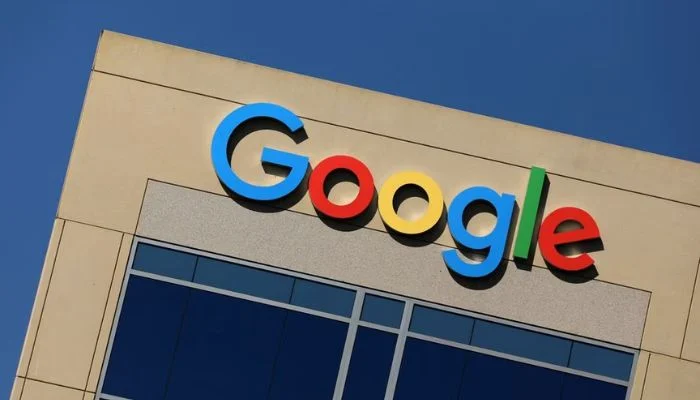LONDON: Alphabet lost $100 billion in market value on Wednesday after the Google AI chatbot, considered to be a ChatGPT alternative, shared inaccurate information in a promotional video and a company event failed to dazzle, feeding worries that the Google parent is losing ground to rival Microsoft.
Alphabet shares slid as much as 9% during regular trading with volumes nearly three times the 50-day moving average. They pared losses after hours and were roughly flat. The stock had lost 40% of its value last year but rallied 15% since the beginning of this year, excluding Wednesday’s losses.
Reuters was the first to point out an error in Google’s advertisement for chatbot Bard, which debuted on Monday, about which satellite first took pictures of a planet outside the Earth’s solar system.
Google has been on its heels after OpenAI, a startup Microsoft is backing with around $10 billion, introduced software in November that has wowed consumers and become a fixation in Silicon Valley circles for its surprisingly accurate and well-written answers to simple prompts.
Google’s live-streamed presentation on Wednesday morning did not include details about how and when it would integrate Bard into its core search function. A day earlier, Microsoft held an event touting that it had already released to the public a version of its Bing search with ChatGPT functions integrated.
Bard’s error was discovered just before the presentation by Google, based in Mountain View, California.
“While Google has been a leader in AI innovation over the last several years, they seemed to have fallen asleep on implementing this technology into their search product,” said Gil Luria, senior software analyst at DA Davidson. “Google has been scrambling over the last few weeks to catch up on Search and that caused the announcement yesterday (Tuesday) to be rushed and the embarrassing mess up of posting a wrong answer during their demo.”
Microsoft shares rose around 3% on Wednesday, and were flat in post-market trading.
Alphabet posted a short GIF video of Bard in action via Twitter, promising it would help simplify complex topics, but it instead delivered an inaccurate answer.
In the advertisement, Bard is given the prompt: “What new discoveries from the James Webb Space Telescope (JWST) can I tell my nine-year old about?” Bard responds with a number of answers, including one suggesting the JWST was used to take the very first pictures of a planet outside the Earth’s solar system, or exoplanets. The first pictures of exoplanets were, however, taken by the European Southern Observatory’s Very Large Telescope (VLT) in 2004, as confirmed by NASA.
“This highlights the importance of a rigorous testing process, something that we’re kicking off this week with our Trusted Tester program,” a Google spokesperson said. “We’ll combine external feedback with our own internal testing to make sure Bard’s responses meet a high bar for quality, safety and groundedness in real-world information.”
Formidable competitor
Alphabet is coming off a disappointing fourth quarter as advertisers cut spending.
The search and advertising giant is moving quickly to keep pace with OpenAI and rivals, reportedly bringing in founders Sergey Brin and Larry Page to accelerate its efforts.
“People are starting to question is Microsoft going to be a formidable competitor now against Google’s really bread-and-butter business,” said King Lip, chief strategist at Baker Avenue Wealth Management, which owns Alphabet and Microsoft shares.
Lip cautioned, though, that concerns about Alphabet may be overblown, saying: “I think still Bing is a far, far cry away from Google’s search capabilities.”
The new ChatGPT software has injected excitement into technology firms after tens of thousands of job cuts in recent weeks and executive pledges to pare back on so-called moonshot projects. AI has become a fixation for tech executives who have mentioned it as much as six times more often on recent earnings calls than in prior quarters, Reuters found.
The appeal of AI-driven search is that it could spit out results in plain language, rather than in a list of links, which could make browsing faster and more efficient. It remains unclear what impact that might have on targeted advertising, the backbone of search engines like Google.
Chatbot AI systems also carry risks for corporations because of inherent biases in their algorithms that can skew results, sexualize images or even plagiarize, as consumers testing the service have discovered. Microsoft, for instance, released a chatbot on Twitter in 2016 that quickly began generating racist content before being shut down. And an AI used by news site CNET was found to produce factually incorrect or plagiarised stories.
At the time of writing, the Bard ad had been viewed on Twitter more than a million times.

 Latest News3 days ago
Latest News3 days ago
 Latest News3 days ago
Latest News3 days ago
 Entertainment3 days ago
Entertainment3 days ago
 Latest News3 days ago
Latest News3 days ago
 Latest News3 days ago
Latest News3 days ago
 Latest News3 days ago
Latest News3 days ago
 Latest News3 days ago
Latest News3 days ago
 Latest News3 days ago
Latest News3 days ago

























